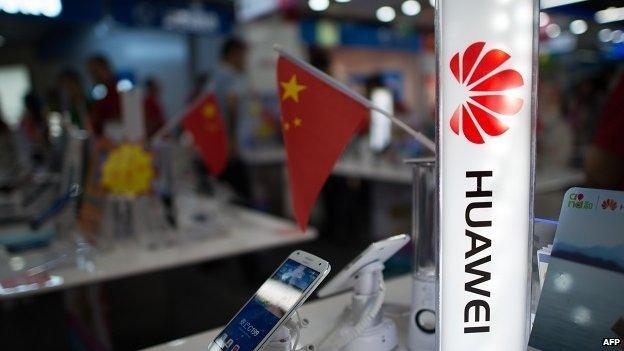World's "most mysterious" chief executive
- Published
- comments

In our media-saturated age, it's rare to have a chief executive who doesn't speak to the press or, indeed, very often publicly.
Yet, the chief executive and founder of the world's largest telecommunications company is rarely seen.
Chinese journalists say it's easier to hear from the Chinese premier than Huawei's Ren Zhengfei. And yet, to understand Huawei you need to know the mysterious founder.
I had an unique opportunity at Davos to sit down with Mr Ren in his first one-on-one interview, and discovered a new face for Chinese business.
Of course, Ren Zhengfei is not a young man. He's 71 years old and founded Huawei in 1987 in his '40s.
But, in just 28 years, Huawei has grown into not just one of the biggest companies in the world, but also China's first global brand, according to Interbrand.
In that sense, as one of the first and few Chinese multinational companies, Huawei is of a new generation of firms that are "going global". They are already transforming global business, and understanding what these private firms represent will be key.
I've visited Huawei over the past year, and discovered that their Shenzhen headquarters were reminiscent of Silicon Valley. It's where Mr Ren got the idea from.
Pragmatic
I recall riding their golf buggy and passing a lake with a sprawling, pavilion-like, set of buildings which were pointed out to me as Mr Ren's office. He seemed to be a elusive figure even when we had unprecedented access to film at Huawei.
On my last trip, I met Mr Ren in his office. We sat outside, next to a pond, and discussed everything under the sun (off-the-record). But at the World Economic Forum, we did it on the record, in his first broadcast interview.
As in private, in public Mr Ren answers all questions put to him in a wide-ranging manner.
Using metaphors like rivers winding around mountains, he characterises his pragmatic approach to business.
By avoiding the difficult, while seeking out opportunities - originally those niches left open by China's dominant state-owned enterprises that were particularly dominant during the 1980s and 1990s when China was first opening to market forces - Huawei was able to flourish.
But, he's also direct when asked about allegations of spying by Huawei. The Chinese government has never asked Huawei to spy.
When I asked him to make clear that he had left the military and that he and his company no longer have links to the Chinese government or the military, Mr Ren said that they advocate for the Chinese Communist Party and are loyal to their country but wouldn't allow that to affect the interests or security of other countries.
Relaxed
His personal story will be the subject of another of my blogs, along with some of the behind the scenes access that I had.
In the interview, he did share some of his family background that motivated him to found Huawei and how he managed to instil a culture that has generated innovation.
That's fairly unusual for perhaps one of the most mysterious CEOs. But, it also reflects a confidence that the Chinese entrepreneurs of today share.
In stark contrast to a perception of straight-laced chief executives who stick to written scripts, Mr Ren is relaxed and unscripted. Like his campus, he is more reminiscent of Silicon Valley entrepreneurs in that sense.
That confidence may be novel to see, but it is likely to be the new face of Chinese businesses which are now coming into their own.
But, the questions over the links to the Chinese state and a need for greater transparency are likely to linger unless there are more sessions like what I did with Mr. Ren.